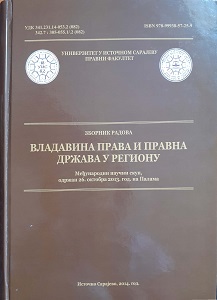Споразумна диоба у браку стечене имовине (de lege lata и de lege ferenda)
Amicable Division of Property Acquired in Marriage (de lege lata and de lege ferenda)
Author(s): Stanka Stjepanović
Subject(s): Law, Constitution, Jurisprudence, Family and social welfare
Published by: Правни факултет Универзитета у Источном Сарајеву
Keywords: Distribution;Common property;Notarized documents;Creditor;Debtor;Court;
Summary/Abstract: Amicable division of property acquired in marriage may be the desire of spouses to their undetermined interests. This can happen during marriage and at point of dissolution of marriage. The focus of this paper is on amicable division of property acquired in marriage. But the agreement does not always reflect the free will of the contractor; usually it is the pressure of one spouse which leads to violation of the rights of another spouse. The analysis of consensual division leads to a conclusion that there is a need to amend the law regulating mandatory form of such an agreement. Amicable division of property acquired in marriage has two dimensions: the constitutionally guaranteed freedom of contract and equality of spouses and at the same time limits the freedom rights of third parties, in particular, freedom rights of public bodies. Therefore, amicable division of property acquired in marriage should always take the form of a court settlement. If the spouses have minor children or children over whom they have extended parental rights and guardianship, representative of authority should be present at the proceedings. The court should require that the parties make a statement, under civil and criminal liability, that they have no debts to third parties. If, however, parties do have debts to third parties, the said third party(ies) should submit statements confirming they are familiar with the agreement of the spouses, and that this agreement is not contrary to their interests. This would prevent abuse of the rights of spouses to amicably division. It is also important that the judge at the hearing carries out detailed examination in order to make sure that neither of the spouses was forced or tricked into concluding such an agreement. In legal theory and jurisprudence there are different possible interpretations of using the Paulian claim in canceling agreement on division of property acquired during marriage. Paulian claim is possible in these cases, but anyway, it is better to prevent a lawsuit being filed before the court by corroborating an agreement with participants and creditors.
- Page Range: 419-435
- Page Count: 17
- Publication Year: 2013
- Language: Serbian
- Content File-PDF

